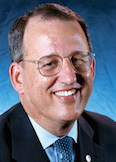A Season of Remembrance
Posted on May 21, 2007On May 31, 1843, 31 former UNC students came together in Chapel Hill at Commencement to start an alumni association. Gov. John Motley Morehead (class of 1817), was chosen to be the first president of the General Alumni Association, whose purposes were:
- “Perpetuate the friendships formed in the collegiate course;
- “Promote the welfare of alma mater; and
- “Promote the cause of education generally.”

Doug Dibbert ’70
Alumnus and U.S. President James K. Polk (class of 1818) attended the 1948 meeting and launched the eventual successful GAA campaign to erect a monument to UNC’s first present, Joseph Caldwell. And in 1850, the trustees voted to fund Smith Building which included a dining hall, a ballroom, and a room for the trustees and the alumni association.
Reunions remain a centerpiece for alumni programs. Not only do they provide alumni occasions to reconnect with each other and our University, they also afford opportunities for former students to experience again the intellectual life of our campus through the GAA’s ever-expanding enrichment programs. With the opening of the George Watts Hill Alumni Center in 1993, the GAA has sponsored most class reunions on Commencement weekend, while affinity reunions – including the Morehead Alumni Forum, Black Alumni Reunion, women’s soccer, men’s crew, marching band and fraternity and sorority gatherings – often are held in conjunction with Homecoming Weekend in the fall and may be held at any time of year.
Spring reunions and Commencement mark an appropriate time to express our thanks to many people whose faces we may seldom see but whose good works we benefit from each day. I refer to the University’s staff, whose love for and devotion to Carolina remains boundless. Their positions and titles may not draw them to our immediate attention, but they help keep Carolina special.
They seek no accolades, but their work is essential. After the students and faculty have left the classrooms, the housekeepers dust and remove trash. The groundkeepers ensure that we continue to enjoy a beautiful campus with well-trimmed grass and well-maintained gardens and trees. Traffic and safety personnel try to do the impossible – ensure that the too-few parking areas on campus are maintained, that traffic flows and that, during the occasional ice and snow storms, sidewalks and streets are cleared for safe travel. Student health and hospital personnel provide quality health care and friendly smiles to students whose anxieties about midterms are complicated by the annual winter flu. Resident advisers work to provide residence hall environments that encourage personal and academic development.
The University’s physical plant staff and maintenance crews help repair our aging facilities and ensure that we’re good stewards of our many exciting new buildings. Secretaries and administrative assistants prepare payroll, class records and process the myriad forms necessary to keep Carolina moving. None of the University’s loyal staff seeks personal glory, although they are recognized for their length of service and some, based on the quality of their performance, receive the C. Knox Massey Distinguished Service Award. And while many staff may not have attended Carolina, all take pride in the history, traditions and qualities that make Carolina and Chapel Hill special.
Each of us plays an important role in shaping our University community. These words of tribute to our University staff should not take away from the importance of the inspired leadership that comes from our faculty and administration as well as our students and alumni. However, let us never forget those whose work is of immense importance, though they may be too often taken for granted. The contributions of University staff are vital. Let’s take time to express our appreciate. Let us each say, “Thank you.”
•••
Each year, five to 10 enrolled Carolina students die before they can participate in their much anticipated Kenan Stadium graduation. Seldom do these deaths attract much attention. By now, most readers know that on March 23, senior Jason Ray, who portrayed the mascot, Rameses, was struck by a vehicle on a New Jersey highway while in town for the NCAA Tournament. He died on March 26. Jason was more than Rameses. As an organ donor, he enhanced the lives of 50 grateful recipients. There is more about this special young man and alumni reaction to his death on pages 5 and 14). We at the GAA will remember Jason as the Rameses who enthusiastically participated in our football away pre-game events and served on the wait staff at The Carolina Club. Others will remember him as their special neighbor, friend, classmate, roommate and son. Like many others, my niece will remember Jason as the Rameses with whom she had her photograph taken in the Smith Center. We can all be grateful to have been touched by Jason even, sadly, if the touch came only in learning of and responding to his tragic death. Let Jason’s passing and the tragic deaths resulting from the massacre at Virginia Tech prompt each of us to reach out to the loved ones and friends who remain among us, knowing that life is to be celebrated in the present, not in some distant future. Too often that future may slip away.
Yours at Carolina,

Douglas S. Dibbert ’70
